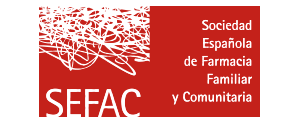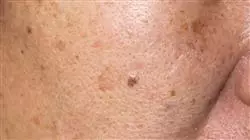University certificate
Scientific endorser

The world's largest faculty of pharmacy”
Introduction to the Program
This Postgraduate certificate in Pharmaceutical Care in Frequent Dermatological Pathologies is the most complete and up-to-date scientific program on the market”

In this sense, on many occasions the community pharmacy becomes the first step in the chain of care for patients with dermatological problems, many patients who, due to lack of time, convenient accessibility or because of trust or other issues, choose community pharmacists as the first health professional to address their problems, including dermatological problems and skin care. This is largely due to the fact that patients obtain an effective solution thanks to the advice of pharmacy specialists. In fact, according to a SEFAC study conducted in 2014 among 334 patients throughout Spain, 61% of consultations on pathologies related to dermatological problems attended by pharmacists are resolved without the need for patients to be referred to a primary care physician or a specialist, demonstrating the enormous potential community pharmacy has in the prevention, detection and treatment of pathologies related to dermatological problems.
On many occasions, when patients are faced with dermatological problems, they often go first to the pharmacy for advice before turning to their family physician or directly to a dermatologist.
The community pharmacist, the health professional closest to the population, plays a fundamental role in the approach and prevention of minor skin problems of frequent occurrence.
The need for this program is based on the widespread ignorance of dermatological pathologies, to which patients tend to attach less importance than to other ailments, erroneously imbued with the belief that skin care should be limited to photoprotection. This lack of skin care is both a challenge and an opportunity for the community pharmacist.
This Postgraduate certificate is made up of several modules developed by a team of community pharmacists belonging to the Spanish Society of Family and Community Pharmacy (SEFAC), national leaders in each subject matter. These topics include an up-to-date review of the treatment of most of the dermatological pathologies that can reach a community pharmacy, some of them agreed with medical scientific societies.
Expand your knowledge through the Postgraduate certificate in Pharmaceutical Care in Frequent Dermatological Pathologies in a practical way adapted to your needs”
This Postgraduate certificate in Pharmaceutical Care in Frequent Dermatological Pathologies is the most complete and up-to-date scientific program on the market. The most important features of the program include:
- More than 75 clinical cases presented by experts in Pharmaceutical Care in Frequent Dermatological Pathologies
- The graphic, schematic, and eminently practical contents of which they are composed provide scientific and practical information on the disciplines that are essential for professional practice
- Diagnostic-therapeutic developments in the assessment, diagnosis, and intervention of Pharmaceutical Care in Frequent Dermatological Pathologies
- It contains practical exercises where the self-evaluation process can be carried out to improve learning
- Algorithm-based interactive learning system for decision-making in the presented clinical situations
- With special emphasis on evidence-based medicine and research methodologies in Pharmaceutical Care in Frequent Dermatological Pathologies
- All this will be complemented by theoretical lessons, questions to the expert, debate forums on controversial topics, and individual reflection assignments
- Content that is accessible from any fixed or portable device with an Internet connection
This Postgraduate certificate may be the best investment you can make in selecting a refresher program for two reasons: in addition to updating your knowledge of Pharmaceutical Care in Frequent Dermatological Pathologies, you will obtain a qualification from TECH Global University”
Its teaching staff includes professionals belonging to the field of Pharmaceutical Care in Frequent Dermatological Pathologies, who contribute their work experience to this training, as well as recognized specialists belonging to leading scientific societies.
The multimedia content developed with the latest educational technology will provide the professional with situated and contextual learning, i.e., a simulated environment that will provide an immersive training program to train in real situations.
The design of this program is based on Problem-Based Learning, by means of which the health professional must try to solve the different professional practice situations that arise throughout the course. To that end, professionals will be assisted by an innovative interactive video system created by renowned and experienced experts in Pharmaceutical Care in Frequent Dermatological Pathologies.
Increase your decision-making confidence by updating your knowledge through this program"

Seize the opportunity to update your knowledge of Pharmaceutical Care in Frequent Dermatological Pathologies and improve your patient care"
Why study at TECH?
TECH is the world’s largest online university. With an impressive catalog of more than 14,000 university programs available in 11 languages, it is positioned as a leader in employability, with a 99% job placement rate. In addition, it relies on an enormous faculty of more than 6,000 professors of the highest international renown.

Study at the world's largest online university and guarantee your professional success. The future starts at TECH”
The world’s best online university according to FORBES
The prestigious Forbes magazine, specialized in business and finance, has highlighted TECH as “the world's best online university” This is what they have recently stated in an article in their digital edition in which they echo the success story of this institution, “thanks to the academic offer it provides, the selection of its teaching staff, and an innovative learning method aimed at educating the professionals of the future”
A revolutionary study method, a cutting-edge faculty and a practical focus: the key to TECH's success.
The most complete study plans on the university scene
TECH offers the most complete study plans on the university scene, with syllabuses that cover fundamental concepts and, at the same time, the main scientific advances in their specific scientific areas. In addition, these programs are continuously being updated to guarantee students the academic vanguard and the most in-demand professional skills. In this way, the university's qualifications provide its graduates with a significant advantage to propel their careers to success.
TECH offers the most comprehensive and intensive study plans on the current university scene.
A world-class teaching staff
TECH's teaching staff is made up of more than 6,000 professors with the highest international recognition. Professors, researchers and top executives of multinational companies, including Isaiah Covington, performance coach of the Boston Celtics; Magda Romanska, principal investigator at Harvard MetaLAB; Ignacio Wistumba, chairman of the department of translational molecular pathology at MD Anderson Cancer Center; and D.W. Pine, creative director of TIME magazine, among others.
Internationally renowned experts, specialized in different branches of Health, Technology, Communication and Business, form part of the TECH faculty.
A unique learning method
TECH is the first university to use Relearning in all its programs. It is the best online learning methodology, accredited with international teaching quality certifications, provided by prestigious educational agencies. In addition, this disruptive educational model is complemented with the “Case Method”, thereby setting up a unique online teaching strategy. Innovative teaching resources are also implemented, including detailed videos, infographics and interactive summaries.
TECH combines Relearning and the Case Method in all its university programs to guarantee excellent theoretical and practical learning, studying whenever and wherever you want.
The world's largest online university
TECH is the world’s largest online university. We are the largest educational institution, with the best and widest online educational catalog, one hundred percent online and covering the vast majority of areas of knowledge. We offer a large selection of our own degrees and accredited online undergraduate and postgraduate degrees. In total, more than 14,000 university degrees, in eleven different languages, make us the largest educational largest in the world.
TECH has the world's most extensive catalog of academic and official programs, available in more than 11 languages.
Google Premier Partner
The American technology giant has awarded TECH the Google Google Premier Partner badge. This award, which is only available to 3% of the world's companies, highlights the efficient, flexible and tailored experience that this university provides to students. The recognition as a Google Premier Partner not only accredits the maximum rigor, performance and investment in TECH's digital infrastructures, but also places this university as one of the world's leading technology companies.
Google has positioned TECH in the top 3% of the world's most important technology companies by awarding it its Google Premier Partner badge.
The official online university of the NBA
TECH is the official online university of the NBA. Thanks to our agreement with the biggest league in basketball, we offer our students exclusive university programs, as well as a wide variety of educational resources focused on the business of the league and other areas of the sports industry. Each program is made up of a uniquely designed syllabus and features exceptional guest hosts: professionals with a distinguished sports background who will offer their expertise on the most relevant topics.
TECH has been selected by the NBA, the world's top basketball league, as its official online university.
The top-rated university by its students
Students have positioned TECH as the world's top-rated university on the main review websites, with a highest rating of 4.9 out of 5, obtained from more than 1,000 reviews. These results consolidate TECH as the benchmark university institution at an international level, reflecting the excellence and positive impact of its educational model.” reflecting the excellence and positive impact of its educational model.”
TECH is the world’s top-rated university by its students.
Leaders in employability
TECH has managed to become the leading university in employability. 99% of its students obtain jobs in the academic field they have studied, within one year of completing any of the university's programs. A similar number achieve immediate career enhancement. All this thanks to a study methodology that bases its effectiveness on the acquisition of practical skills, which are absolutely necessary for professional development.
99% of TECH graduates find a job within a year of completing their studies.
Postgraduate Certificate in Pharmaceutical Care in Frequent Dermatological Pathologies
.
Sometimes, patients with dermatological problems go to the Community Pharmacy as the first resource for care due to its easy accessibility and the confidence they have in the pharmacist. For this reason, this professional becomes the first health agent to address these problems, more than enough reason to consolidate its update in this demanding area. Therefore, with this Postgraduate Certificate in Pharmaceutical Care in Frequent Dermatological Pathologies you will have the perfect opportunity to update your knowledge, using the keys that a team of community pharmacists from the Spanish Society of Family and Community Pharmacy (SEFAC) have deposited in it.
Make use of the experience of illustrious pharmacists who are experts in Dermatology
.
With this Postgraduate Certificate in Pharmaceutical Care in Frequent Dermatological Pathologies you will get an updated review of the treatment of the main dermatological pathologies that can reach a community pharmacy. The modules have been developed by leading national specialists in each subject and some of them have been agreed upon with medical scientific societies. In this way, you will have the necessary preparation to offer an effective solution to your patients in the approach to dermatological problems and skin care from the pharmaceutical action. All this under a convenient 100% online format.







